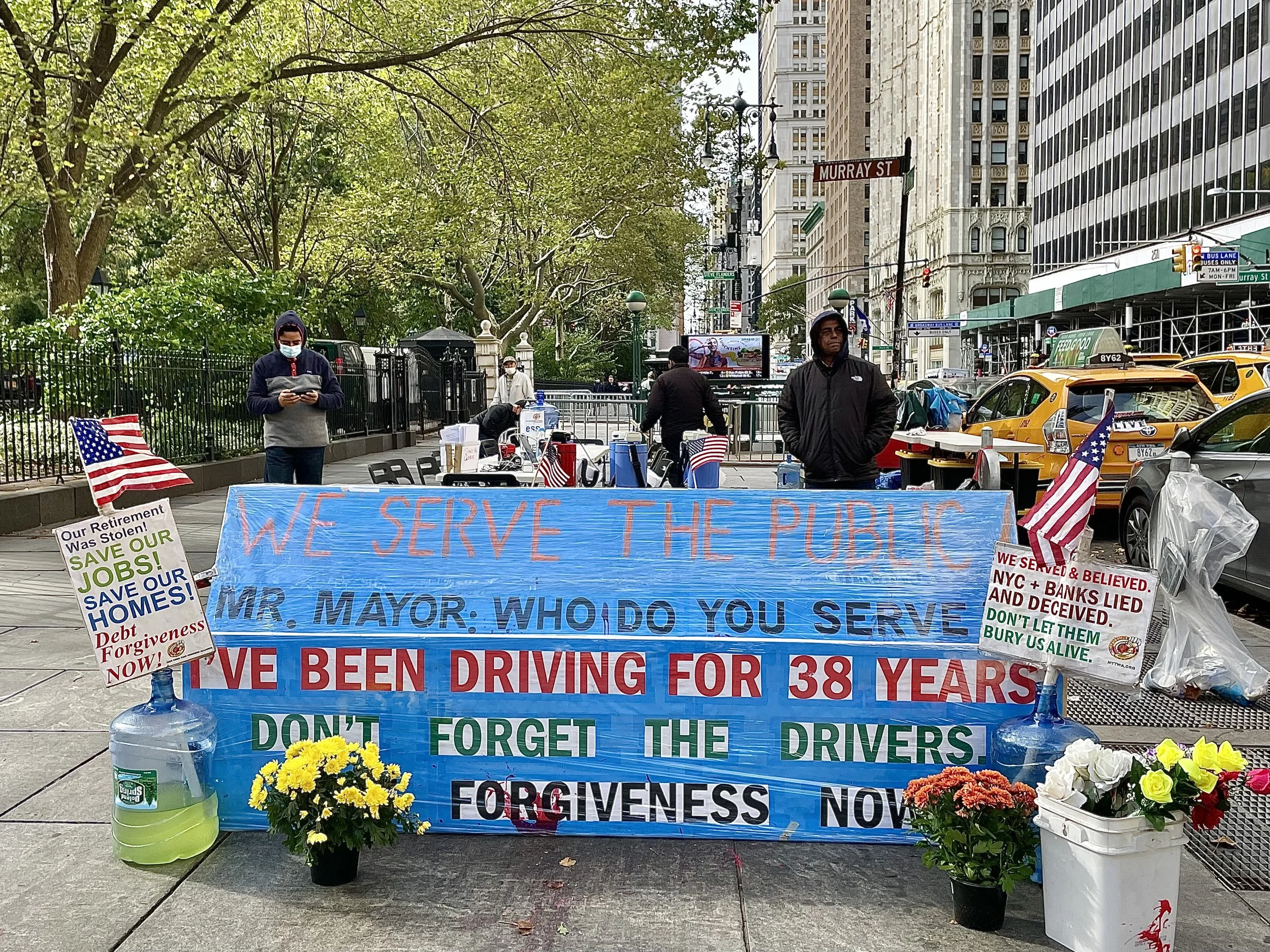NYC taxi workers fighting for survival, low hopes for next mayor
The intersection of Broadway and Murray has a new rhythm: pots, pans, bullhorn sirens and chants of “We want justice! Talk to the Union!”
Taxi medallion owners have held a now 45-day, 24/7 presence near City Hall, demanding that NYC Mayor Bill deBlasio provide taxi workers increased debt relief. Fourteen days ago, demonstrators launched a hunger strike. On this Election Day, they are still fighting.
Despite hopes that the mayor takes action before the next administration begins, the new mayor will help determine the fate of these taxi workers, who, on average, face $550,000 in debt due to how the city government handled medallion auctions, investors’ unregulated loans, and Uber and Lyft in NYC.
Eric Adams, who’s expected to win the mayoral race, gave what medallion owners see as inadequate answers to questions about their plights during the first and second debates.
At the first, hosted by NBC 4 New York, he suggested that the city “allow them to go on the same platform as the Uber drivers.” However, strikers like Elliot Colbert, a representative from the Democratic Socialist Alliance, says drivers already tried that. They still had extreme debt and low wages.
A week later, at the second debate, Adams said, “We need to look at those everyday men and women who are the smaller owners of those medallions.”
But the drivers’ union, the New York Taxi Worker Alliance already has a proposal, and workers say words are not enough, especially because Mayor deBlasio made similar promises. Yet, he didn’t propose his solution, which includes monthly debt payment assistance and $20,000 to restructure loans until the end of his term.
Now, Augustine Tang, a taxi driver and union member, doesn’t feel supported by either candidate.
“We believe that these people just speak with banks and lenders and money. They see this workforce who gave so much for this city, they don’t really think of us as anything else–just immigrants and just workers,” he says.
Tang is also concerned about Adams’ ties to corporations.
Suresh Chand, a taxi driver since 1995, worries that the next administration will not take action because they inherited the problem.
Drivers say the taxi medallion crisis was created by the city. The city government sold highly inflated medallions to many recent immigrants as their ticket to the middle class, using slogans like “Drive Your Future” in various auction advertisements. When the medallion bubble burst, immigrant families had already signed faulty loans that they didn’t understand the terms of.
In 2014, when Uber and Lyft entered the market, taxi drivers lost customers, medallion values plummeted and cabbies were left hopelessly in debt. A bad situation became worse, and nine men committed suicide over their stress.
The crisis unfolded under Mayor deBlasio’s watch, but the progress will extend beyond his term. Kuber Sancho-Persad, who inherited a taxi medallion in 2017 from his late father, said the next steps would be improved income, healthcare, and guaranteed retirement for drivers, so they don’t have to rely on medallion values.
“The [NYTWA] proposal is just a step one of reforming our industry,” he says.
Reform would require immediate and lasting solutions, as the financial ruin from the medallion crisis has decimated families, with many facing home foreclosure, bankruptcy and immense stress from working 16-hour days. Some, like Basia Osowski, are over 65 and have no retirement to rely on. They won’t accept anything less than the NYTWA proposal, which would reduce monthly loan payments to $800 and have the city spend $92 million over 30 years. Over 75 officials, including Comptroller Scott Stringer, have approved the bill.
But when asked about the taxi medallion crisis at the final mayoral debate, Adams didn’t mention the union or the proposal. Instead, he said, “I’m going to be there for them, and we are going to find a solution to this problem.” Later, the campaign was unable to take a request for comment.
Without concrete action, Chand says the workers can’t survive.
“Talking is cheap, and we know that. We have been through this long enough,” says Tang. “If they’re really honestly trying to fix this crisis, then they will adopt New York Taxi Workers Alliance’s plan.”
